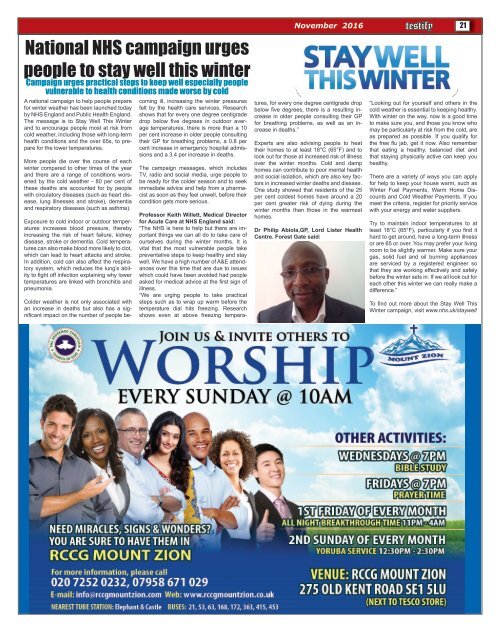You also want an ePaper? Increase the reach of your titles
YUMPU automatically turns print PDFs into web optimized ePapers that Google loves.
National NHS campaign urges<br />
people to stay well this winter<br />
Campaign urges practical steps to keep well especially people<br />
vulnerable to health conditions made worse by cold<br />
A national campaign to help people prepare<br />
for winter weather has been launched today<br />
by NHS England and Public Health England.<br />
The message is to Stay Well This Winter<br />
and to encourage people most at risk from<br />
cold weather, including those with long-term<br />
health conditions and the over 65s, to prepare<br />
for the lower temperatures.<br />
More people die over the course of each<br />
winter compared to other times of the year<br />
and there are a range of conditions worsened<br />
by the cold weather - 80 per cent of<br />
these deaths are accounted for by people<br />
with circulatory diseases (such as heart disease,<br />
lung illnesses and stroke), dementia<br />
and respiratory diseases (such as asthma).<br />
Exposure to cold indoor or outdoor temperatures<br />
increases blood pressure, thereby<br />
increasing the risk of heart failure, kidney<br />
disease, stroke or dementia. Cold temperatures<br />
can also make blood more likely to clot,<br />
which can lead to heart attacks and stroke.<br />
In addition, cold can also affect the respiratory<br />
system, which reduces the lung’s ability<br />
to fight off infection explaining why lower<br />
temperatures are linked with bronchitis and<br />
pneumonia.<br />
Colder weather is not only associated with<br />
an increase in deaths but also has a significant<br />
impact on the number of people becoming<br />
ill, increasing the winter pressures<br />
felt by the health care services. Research<br />
shows that for every one degree centigrade<br />
drop below five degrees in outdoor average<br />
temperatures, there is more than a 10<br />
per cent increase in older people consulting<br />
their GP for breathing problems, a 0.8 per<br />
cent increase in emergency hospital admissions<br />
and a 3.4 per increase in deaths.<br />
The campaign messages, which includes<br />
TV, radio and social media, urge people to<br />
be ready for the colder season and to seek<br />
immediate advice and help from a pharmacist<br />
as soon as they feel unwell, before their<br />
condition gets more serious.<br />
November 2016 testify<br />
21<br />
Professor Keith Willett, Medical Director<br />
for Acute Care at NHS England said:<br />
“The NHS is here to help but there are important<br />
things we can all do to take care of<br />
ourselves during the winter months. It is<br />
vital that the most vulnerable people take<br />
preventative steps to keep healthy and stay<br />
well. We have a high number of A&E attendances<br />
over this time that are due to issues<br />
which could have been avoided had people<br />
asked for medical advice at the first sign of<br />
illness.<br />
“We are urging people to take practical<br />
steps such as to wrap up warm before the<br />
temperature dial hits freezing. Research<br />
shows even at above freezing temperatures,<br />
for every one degree centigrade drop<br />
below five degrees, there is a resulting increase<br />
in older people consulting their GP<br />
for breathing problems, as well as an increase<br />
in deaths.”<br />
Experts are also advising people to heat<br />
their homes to at least 18°C (65°F) and to<br />
look out for those at increased risk of illness<br />
over the winter months. Cold and damp<br />
homes can contribute to poor mental health<br />
and social isolation, which are also key factors<br />
in increased winter deaths and disease.<br />
One study showed that residents of the 25<br />
per cent coldest homes have around a 20<br />
per cent greater risk of dying during the<br />
winter months than those in the warmest<br />
homes.<br />
Dr Philip Abiola,GP, Lord Lister Health<br />
Centre. Forest Gate said:<br />
“Looking out for yourself and others in the<br />
cold weather is essential to keeping healthy.<br />
With winter on the way, now is a good time<br />
to make sure you, and those you know who<br />
may be particularly at risk from the cold, are<br />
as prepared as possible. If you qualify for<br />
the free flu jab, get it now. Also remember<br />
that eating a healthy, balanced diet and<br />
that staying physically active can keep you<br />
healthy.<br />
There are a variety of ways you can apply<br />
for help to keep your house warm, such as<br />
Winter Fuel Payments, Warm Home Discounts<br />
and Cold Weather Payments. If you<br />
meet the criteria, register for priority service<br />
with your energy and water suppliers.<br />
Try to maintain indoor temperatures to at<br />
least 18°C (65°F), particularly if you find it<br />
hard to get around, have a long-term illness<br />
or are 65 or over. You may prefer your living<br />
room to be slightly warmer. Make sure your<br />
gas, solid fuel and oil burning appliances<br />
are serviced by a registered engineer so<br />
that they are working effectively and safely<br />
before the winter sets in. If we all look out for<br />
each other this winter we can really make a<br />
difference.”<br />
To find out more about the Stay Well This<br />
Winter campaign, visit www.nhs.uk/staywell



